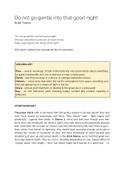Do not go gentle into that good night
Dylan Thomas
“Do not go gentle into that good night,
Old age should burn and rave at close of day;
Rage, rage against the dying of the light.”
(Full poem unable to be reproduced due to copyright)
VOCABULARY
Rave - several meanings: to talk enthusiastically and passionately about something,
to speak incoherently as if one is delirious or mad, a lively party
Deeds - acts that are done in a serious or strongly deliberate manner
Meteors - small rocks that enter the earth’s atmosphere from space, travelling very
fast and appearing as a stream of light in the sky
Grave - serious and important, or relating to the grave (as in a graveyard)
Gay - an old fashioned word meaning happy, content (the modern meaning is
different)
STORY/SUMMARY
The poem starts with a command: don’t die gently, people in old age should ‘burn and
rave’, they should be passionate and fierce. They should ‘rage’ - fight angrily and
powerfully - against their death. In Stanza 2, we’re told that even though wise men
know they will eventually die (‘dark is right’), they still refuse to die peacefully because
they want their life to make an impact, and they feel that they still have more to give -
their words ‘had forked no lightning’, they hadn’t been powerful enough yet to jolt or
change the course of humanity, so they still have something to work towards and
shouldn’t just give up and accept death. In the third Stanza, we’re told that good men
also rage against death, they are sad or shouting (depending on your interpretation of
‘crying’) about ‘how bright / their frail deeds might have danced in a green bay’ - i.e.
, how much of an impact their actions could have had on the world. The phrase ‘the last
wave by’ also has a double interpretation - either they are waving goodbye as they are
at the last phase of their life, or their life is like a wave that crashes and leaves an
impact of its ‘deeds’ on the world. Stanza 4 explores wild men, our ancestors, who
learned to harness the powers of the sun and worshipped or ‘sang’ to it as it moved
across the sky ‘in flight’. As they are uneducated they learn ‘too late’ that death will
happen to them, and so they also react with ‘rage’. In Stanza 5, grave men (serious
men) who are also close to the ‘grave’ - ‘near death’ - have a clarity of vision and
understanding of the world more complex than younger men, they can see ‘with
blinding sight’, the truth of mortality and death almost blinds them or makes them less
able to engage with the physical world as they become more focused on the afterlife
and spirituality. They are ‘gay’, happy with their life.
The last Stanza takes a shift in tone, becoming personal for the first time: ‘you, my
father’. It suddenly becomes about the poet himself and his relationship with his father,
and we realise that the rest of the poem has been building up to this moment, where
he is trying to send a message to his father about his approach to death. Thomas asks
the father to ‘curse’ and ‘bless’ him with his ‘fierce tears’, a sign of life, anger, passion,
extremes of emotion. And finally, he repeats the lines of the first stanza as a couplet:
asking his father to not slip quietly into death, but instead to fight it until the very end.
SPEAKER/VOICE
The poem primarily uses third person omniscient narration to explore different types
of men - the wise, the good, the wild and the grave - and their approach to death,
observing that all kinds of brilliant men fight against death when it comes to them at
the end of their lives. The final stanza shifts to first person, using the possessive
pronoun ‘my’ to show that the poet has really been speaking to his own father all
along, and that this topic is in fact very personal to him, rather than just general. He
urges his father strongly to keep living, so we can interpret the poem as an act of
desperation, where the poet is not ready to let go and accept that the father is dying,
and the previous stanzas have been building into an argument that proves he should
continue fighting to live.





